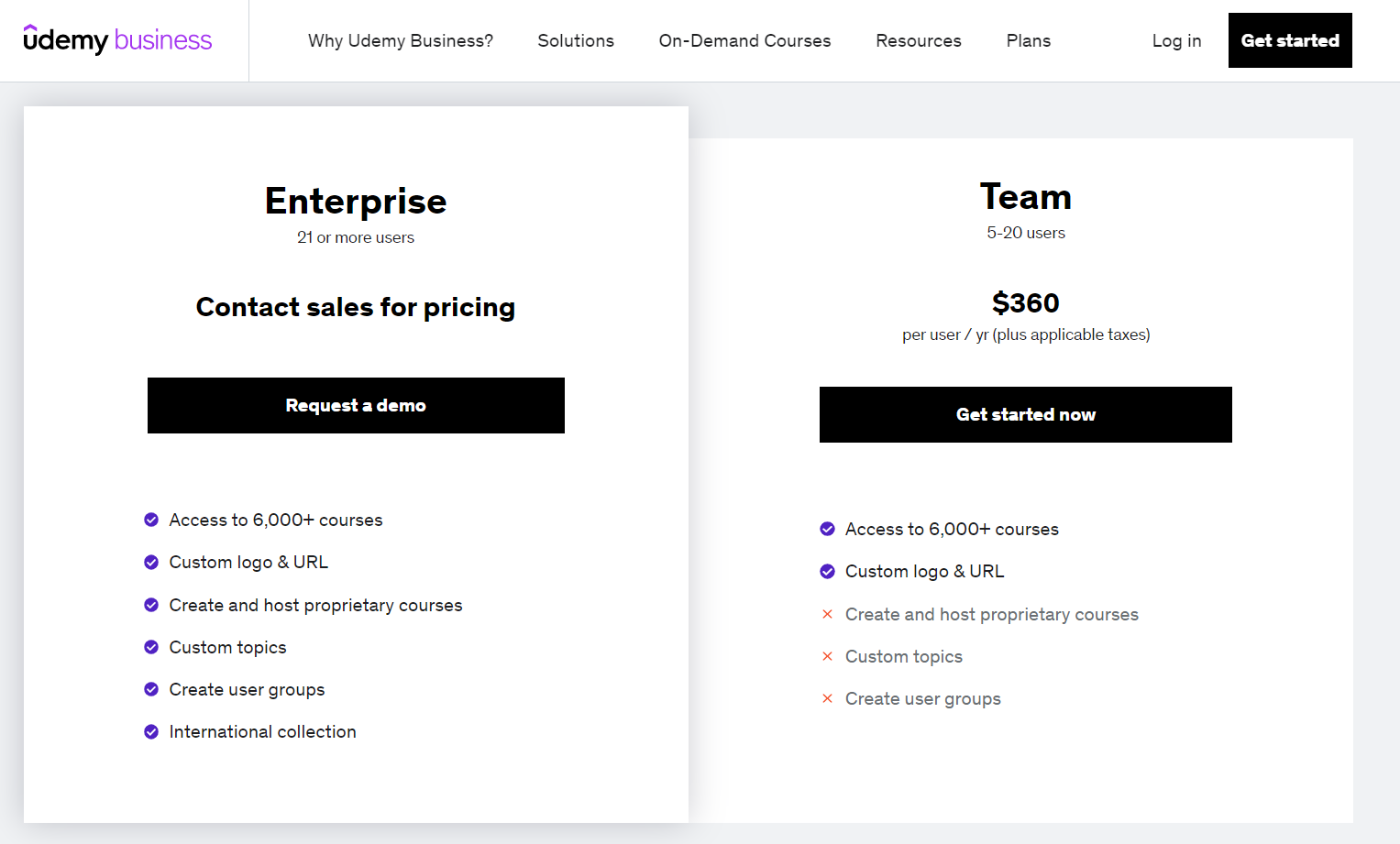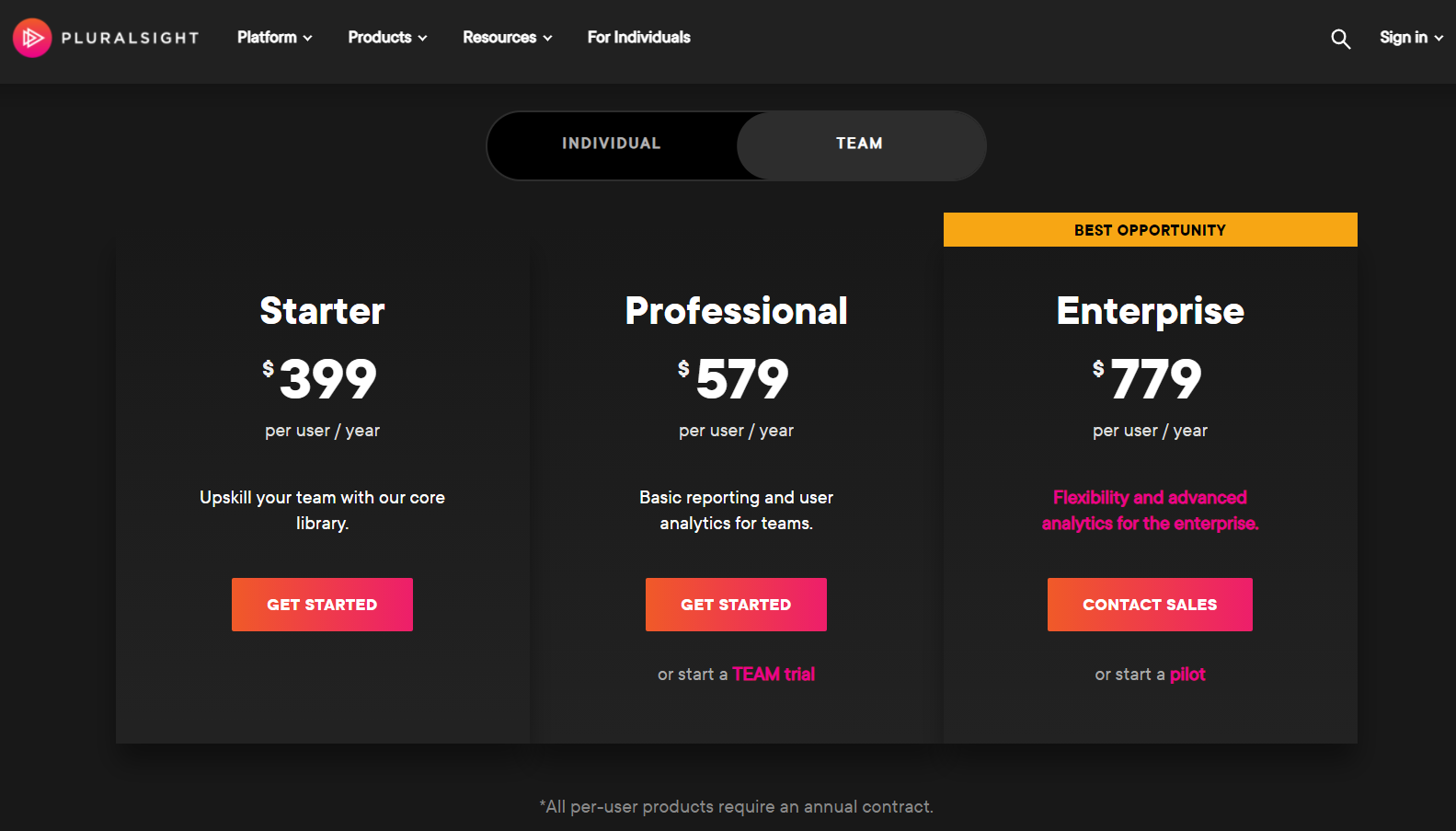When it comes to choosing the right e-learning platform for your business, there are a lot of great learning management system (LMS) options available in the marketplace. It’s crucial to find the right one that provides the best value for your money. Two of the popular online course platforms are Pluralsight and Udemy.
Pluralsight is an online education and workforce development platform that helps individuals and small businesses grow and adjust to the ever-changing technological advancements. With a variety of training courses for software developers, IT administrators, and creative professionals, Pluralsight provides your technical teams with a unified learning experience.
Pluralsight offers expert-authored courses, hands-on learning projects, skills assessments and analytics, certification content, learning paths and workflows, and cloud labs to equip your employees with the most in-demand technical skills. Pluralsight offers monthly and annual plans for individuals as well as teams.
Udemy is a massive online open course (MOOC) provider and a popular e-learning platform that allows entrepreneurs and small enterprises to host and sell their courses online. Udemy for Business is an enterprise-grade platform designed for small, medium, and large enterprises to upskill their workforce. Managers and administrators can create and share learning paths with the employees and track their activities for smooth onboarding and training. In addition to buying individual courses, Udemy also offers two business plans: Enterprise and Team Plan.
Let’s compare both LMS vendors based on their features.
Both platforms offer thousands of paid and free courses, categorized so that it’s easy for you to browse through their catalogs. Though Udemy offers courses on all topics imaginable — from arts, lifestyle, and business to more technical topics — Pluralsight focuses more on the technical aspects.
Pluralsight’s course library is split into two: Core Library (available in Starter Plan) and Expanded Library (available in professional and enterprise plans.) Core library offers tons of in-demand courses on topics such as cloud computing, cybersecurity, IT, software and web development, infrastructure, and so on. Expanded library gives you access to courses on more advanced topics if you want to develop expertise in more niche topics with hands-on projects. You can filter the courses based on difficulty (basic, intermediate, advanced), duration, and more. You can also sample a brief overview of the course and watch the instructor’s introduction.
Udemy offers a wide range of courses, categorized into 13 main sections and dozens of subsections. You can filter courses by topic, rating, duration, language, level, and price. Every course comes with a video preview that shows the structure of the course and the instructor’s introduction. Unlike Pluralsight, Udemy allows you to read reviews of the students who have already taken the course.
Unlike Udemy, where anyone can post their course, Pluralsight only allows high-quality content from industry experts, further curated by their staff editors. Thus, Pluralsight courses are more advanced and structured as compared to Udemy courses. But a few users also complain that some Pluralsight courses are outdated and expensive for what you get.
Both platforms provide easily navigable interfaces, quick registration processes, and mobile applications for offline access.
With Udemy, you can register with your name, email, and password and use the trial version for free. With Pluralsight, you’ll be asked to add your payment details on sign-up, even for the free version. You can cancel the subscription before the trial period is over, although failure to do so will result in a charge.
These two LMS systems let you navigate through the top categories, popular topics other students are viewing, or get a recommendation based on your interests. Both platforms allow instructors to create courses with audio/visual and text-based content, add quizzes and exercises, post downloadable material, facilitate feedback and discussions, track progress, and more.
Pluralsight provides a more sophisticated platform for businesses by splitting its approach into two parts: Skills and Flow. With Pluralsight Skills, you can upskill your teams in the trends and technologies you need to meet strategic objectives and succeed in the digital age. With Flow, you can leverage workflow data to better manage and enable your teams. Flow’s analytics allow you to remove roadblocks and improve operations.
For many employees, earning a certificate from an accredited institution matters, as it looks good on your resume and helps you in your career growth. Unlike Coursera and edX that offer official certificates and degrees, Udemy is not an accredited institution. So, even though Udemy offers Certificates of Completion (COC) for paid courses, they are not recognized by employers.
Pluralsight allows you to generate a certificate upon 100% completion of a video course. These certificates can be submitted as CEUs (continuing education units) or CPE (continuing professional education) credits to various organizations. Like Udemy, Pluralsight is also not an accredited platform, but its courses and certificates have a good reputation in the eyes of potential employers and organizations.
While Udemy allows you to pay per-course, Pluralsight offers a subscription-based model which is a more feasible option for businesses looking to upskill their teams.
Udemy for Business offers two plans: Team and Enterprise.
Pluralsight offers three subscription plans for teams: Starter, Professional, and Enterprise.
While Udemy offers a 30-day refund policy, you can also get a 14-days free trial with Pluralsight Professional and Enterprise plans.
After a comprehensive overview of each, we can say that both Pluralsight and Udemy are useful LMS platforms with several significant features that work for business users. While Udemy has a huge catalog of courses in dozens of languages, Pluralsight offers more structured, advanced, and curated content.
Udemy is an affordable option for individuals or employees looking to take a couple of courses to learn a new skill. Pluralsight subscription-based model is more feasible for the small and large businesses looking to train their teams to get them up-to-speed with innovative technology trends.
While Udemy is for self-learners who want to learn at their own time and pace, Pluralsight follows a more structured and professional approach. That’s why Pluralsight is preferred by businesses and HR teams looking to upskill their workforce with a pre-designed learning path and hands-on experience in Cloud Labs.
To compare other LMS products, check our top LMS Products List to know which one is right for your business.
Also read:
Small Business Computing addresses the technology needs of small businesses. To address their needs, SBC offers detailed coverage of cost-effective technology solutions, including lists of top vendors, product comparisons, and how-to guides that offer specific tools to help solve issues.
Advertiser Disclosure: Some of the products that appear on this site are from companies from which TechnologyAdvice receives compensation. This compensation may impact how and where products appear on this site including, for example, the order in which they appear. TechnologyAdvice does not include all companies or all types of products available in the marketplace.








